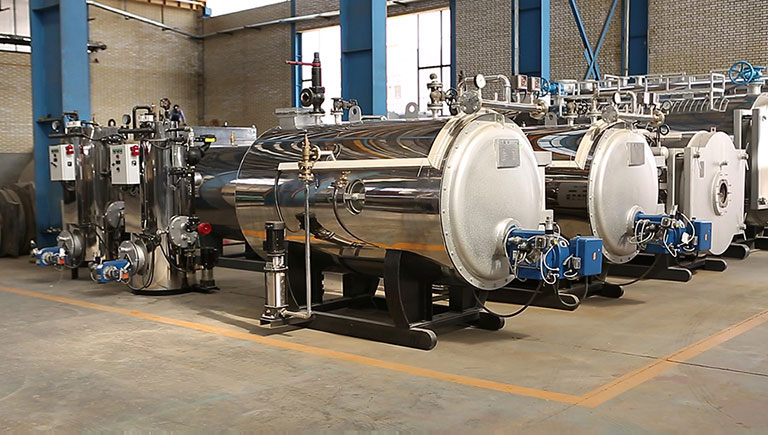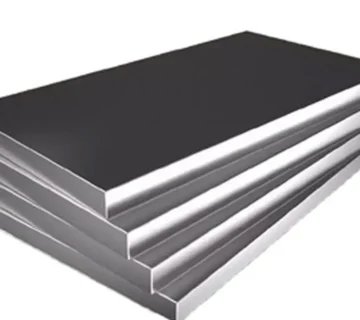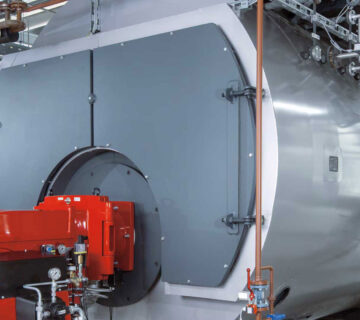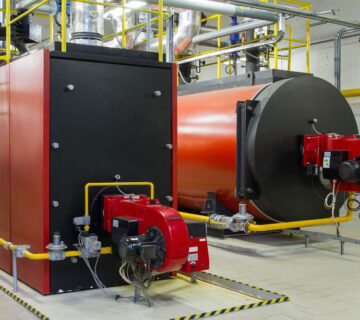Steam boilers play a crucial role in various industries by providing the necessary steam or hot water for different processes. These boilers come in different types and designs, each with its unique features and applications. For businesses seeking the best steam boiler solution, understanding the various types available and their specific uses is vital. In this article, we’ll delve into the main types of steam boilers and explain how they can meet different industrial needs. The focus is on offering insights from Niroo Bokhar Araz, a leading company in steam boiler manufacturing.
1. Fire-Tube Boilers
Fire-tube boilers are among the most common types of steam boilers. In this design, hot gases pass through tubes that are submerged in water. The heat from the gases is transferred to the water, creating steam. These boilers are often used in small to medium-scale industries.
Applications:
- Heating systems
- Small manufacturing processes
- Low-pressure steam applications
Advantages:
- Easy to operate and maintain
- Lower initial cost
- Suitable for lower steam pressure requirements

2. Water-Tube Boilers
In contrast to fire-tube boilers, water-tube boilers operate by allowing water to circulate through tubes while being heated by external combustion gases. This design is more suitable for high-pressure steam applications and larger industrial operations.
Applications:
- Power generation plants
- Chemical and petrochemical industries
- Large manufacturing operations requiring high-pressure steam
Advantages:
- Can handle high pressure and temperature
- Faster steam production
- More efficient for large-scale operations
3. Electric Boilers
Electric boilers are powered by electricity rather than combustion of fuels. These boilers are highly efficient because they don’t lose energy through flue gases. Electric boilers are commonly used where smaller loads of steam or hot water are needed.
Applications:
- Laboratories
- Small industrial applications
- Residential heating
Advantages:
- Highly efficient
- Environmentally friendly (no emissions)
- Compact and easy to install
4. Biomass Boilers
Biomass boilers use organic materials like wood, agricultural waste, or biomass pellets to produce steam. These boilers are increasingly popular as industries move toward renewable energy sources to reduce their carbon footprint.
Applications:
- Food processing industries
- Agricultural industries
- Eco-friendly manufacturing facilities
Advantages:
- Environmentally friendly
- Renewable fuel source
- Lower operational costs in the long term
5. Waste Heat Boilers
Waste heat boilers recover heat from industrial processes or exhaust gases and use it to generate steam. These boilers are highly efficient and help industries save energy and reduce costs.
Applications:
- Refineries
- Steel plants
- Cement industries
Advantages:
- Energy-efficient
- Reduces fuel costs
- Utilizes otherwise wasted heat

Factors to Consider When Choosing a Steam Boiler
When selecting the right steam boiler for your needs, several factors must be considered to ensure maximum efficiency and cost-effectiveness.
1. Fuel Source:
Understanding the availability and cost of fuel in your location is crucial. If you are in an area where electricity is more affordable, an electric boiler might be the right choice. Alternatively, biomass boilers may suit areas with ample organic waste resources.
2. Pressure and Temperature Needs:
If your operation requires high-pressure steam, a water-tube boiler is ideal. For lower pressure, fire-tube boilers or electric options may be more appropriate.
3. Maintenance and Operation:
Different boilers come with different maintenance requirements. Electric boilers, for instance, are low maintenance but may come with higher operational costs compared to fuel-based systems.
4. Environmental Concerns:
For industries focusing on sustainability, biomass or waste heat boilers can provide excellent options that reduce carbon emissions and utilize renewable resources.
Benefits of Working with Niroo Bokhar Araz
At Niroo Bokhar Araz, we offer a wide range of steam boilers tailored to meet specific industrial needs. Our boilers come with advanced safety features, high efficiency, and cost-effective solutions. We ensure that our products meet international standards, including CE and DIN certifications, ensuring top-notch quality for our customers.

Frequently Asked Questions (FAQ)
1. What is the main difference between fire-tube and water-tube boilers?
Fire-tube boilers are suitable for lower pressure applications, while water-tube boilers can handle high pressure and temperature, making them ideal for large-scale industrial operations.
2. How can I reduce fuel costs with a steam boiler?
Using waste heat recovery boilers or biomass boilers can significantly lower fuel costs by utilizing renewable energy sources or recycling industrial waste heat.
3. Are electric boilers more environmentally friendly?
Yes, electric boilers do not emit any greenhouse gases, making them one of the most eco-friendly options, especially when powered by renewable electricity sources.
4. What type of boiler is best for a small manufacturing plant?
A fire-tube boiler or a small electric boiler would be ideal for a small manufacturing plant, as they are easy to operate and cost-effective for smaller steam loads.
5. How often should steam boilers be maintained?
Regular maintenance is crucial to the longevity of a steam boiler. It’s recommended to perform routine inspections and maintenance at least once every quarter, depending on usage.
6. Can I use biomass boilers for large-scale operations?
Biomass boilers are typically more suited to smaller operations due to the fuel handling requirements. However, large-scale biomass boilers are available for industries committed to sustainability.
7. How long does a steam boiler typically last?
With proper maintenance, a well-designed steam boiler can last between 20-30 years.
8. How do I choose the right size boiler for my needs?
The size of the boiler will depend on the amount of steam required for your specific industrial application. Consult with experts at Niroo Bokhar Araz to determine the ideal size for your needs.
9. What certifications should a reliable steam boiler have?
A reliable steam boiler should have CE and DIN certifications, ensuring that it meets international safety and quality standards.
10. Can steam boilers be used for residential heating?
While steam boilers are typically used in industrial applications, smaller electric boilers can be utilized for residential heating.
11. Is a waste heat boiler suitable for all industries?
Waste heat boilers are especially beneficial for industries with high-energy processes, such as refineries and cement plants, where waste heat is abundant.
12. What are the safety features of modern steam boilers?
Modern steam boilers are equipped with advanced safety features, including automatic shutoff valves, pressure relief valves, and temperature controls.
13. How do I improve the efficiency of my steam boiler?
Regular maintenance, proper insulation, and the use of energy-efficient models like waste heat boilers can significantly improve efficiency.
14. What type of steam boiler is best for food processing?
Biomass boilers or small water-tube boilers are often used in food processing due to their ability to generate clean steam.
15. How do I get a quote for a steam boiler?
Contact Niroo Bokhar Araz for a custom quote based on your specific industry requirements and steam needs.
By addressing different types of steam boilers and their applications, this article provides a comprehensive guide for businesses considering their steam generation needs. Each type has its advantages and specific uses, making the selection process crucial to achieving both cost efficiency and operational effectiveness.




